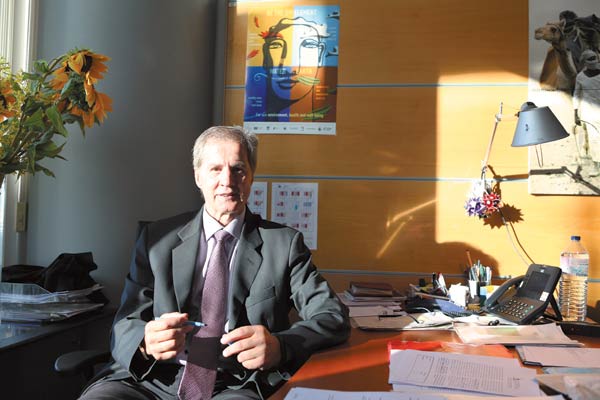 |
|
Jo Leinen, chairman of the European Parliament's delegation for relations with China, says the EU and China should work on an emissions cap and trade system to impose prices on carbon emissions. FU JING/CHINA DAILY |
China should come out with more measures to tackle climate change
The European Union may pressure Beijing to "scale up" its climate change commitments so that China can make considerable progress on its carbon emissions goals by 2025, says Jo Leinen, chairman of the European Parliament's delegation for relations with China.
The call for stronger action comes days after China and the United States announced new limits on CO2 emissions at the recent Asia-Pacific Economic Cooperation meeting in the Chinese capital. In the deal, President Xi Jinping said China would make every effort to reduce its CO2 emissions from 2030.
US President Barack Obama vowed that the US would cut its own emissions by 26-28 percent by 2025 from a 2005 base.
But Leinen, who was also the chairman of the European Parliament's committee on the environment, says: "Both Brussels and Beijing need to scale up their commitments."
There is the opinion in Brussels that China's carbon emissions could soar by 2025, he says.
As part of the deal with the US, Xi said that around 2030, 20 percent of China's energy would come from renewable sources.
The EU has taken a stronger course of action on climate change in recent months. In October, it struck a deal that legally binds its member countries to cut their greenhouse gas emissions 40 percent below 1990 base levels by 2030.
"All (countries) need to scale up and Brussels needs to do more," Leinen says.
While he calls for China to employ a stronger climate change plan, he also says the country has been more outspoken in global climate talks and there are signs from the Chinese leadership it will discuss the deal's time contingency in Paris.
"That will help a lot because the uncertainty of the peak year in China is putting the whole global system in doubt," he says." So the peak year (put on the table) would be good. 2030 is too late and it has to be earlier."
He says Brussels would like to see China hit a peak of its CO2 emissions by 2020, but a compromise between 2020 and 2030 could be reached. He also admits the EU's 2030 target of cutting their greenhouse gas emissions 40 percent below 1990 base levels is not good enough to stabilize global warming.
"I think we can do better. There is a review clause in the decision by the European Council. By 2020, we can review these goals and improve upon them," he says.
In addition to reviewing its climate change goals, the European Parliament could put more pressure on member countries to create tougher renewable energy and efficiency targets, he says.
But one major challenge has loomed large since the 2008 global recession: getting member states in economic straits to be more ambitious in the absence of a binding international agreement on the environment.
"If in Paris, the biggest emitters-the United States and China-have ambitions, goals and objectives, I would say Europe is ready to do more," says Leinen. "Unilaterally, I doubt that the political will (in the EU) exists for us to be far ahead of anybody in the world."
